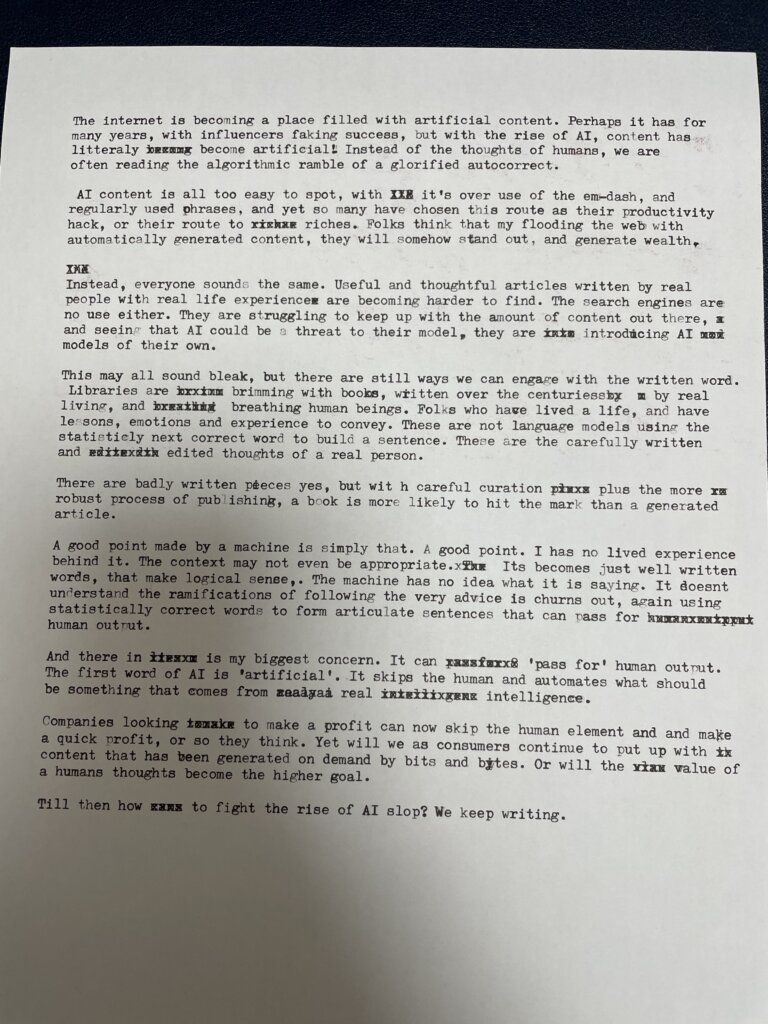The internet is becoming a place filled with artificial content. Perhaps it has for many years, with influencers faking success, but with the rise of AI, content has literally become artificial! Instead of the thoughts of humans, we are often reading the algorithmic ramble of a glorified autocorrect.
AI content is all too easy to spot, with it’s overuse of the em-dash, and regularly used phrases, and yet so many have chosen this route as their productivity hack, or their route to riches. Folks think that by flooding the web with automatically generated content, they will somehow stand out and generate wealth.
Instead, everyone sounds the same. Useful and thoughtful articles written by real people with real life experiences are becoming harder to find. The search engines are no use either. They are struggling to keep up with the amount of content out there and seeing that AI could be a threat to their model, they are introducing AI models of their own.
This may all sound bleak, but there are still ways we can engage with the written word. For example, libraries are brimming with books, written over the centuries by real living and breathing human beings. Folks who have lived a life, and have lessons, emotions and experience to convey. These are not language models using the statistically next correct word to build a sentence. These are the carefully written and edited thoughts of a real person.
There are badly written pieces yes, but with careful curation plus the more robust process of publishing, a book is more likely to hit the mark than an automatically generated article.
A good point made by a machine is simply that. A good point. It has no lived experience behind it. The context may not even be appropriate. It becomes just well written words, that make logical sense. The machine has no idea what it is saying. It doesn’t understand the ramifications of following the very advice is churns out, again using statistically correct words to form articulate sentences that can pass for human output.
And there in is my biggest concern. It can ‘pass for’ human output. The first word of AI is ‘artificial’. It skips the human and automates what should be something that comes from real intelligence.
Companies looking to make a profit can now skip the human element and make a quick profit, or so they think. Yet will we as consumers continue to put up with content that has been generated on demand by bits and bytes. Or will the value of a human’s thoughts become the higher goal.
Till then how to fight the rise of AI slop? We keep writing.
PS: I wrote this on my Silver Reed – Leader II Typewriter, then used OCR to paste on my blog, then did some minor edits. All without AI 🙂


2 comments
Ian Paget
This is so refreshing!! I’m also tired of reading AI polished email from clients, so much to the point I’ve stopped using it for mine – it strips away all the personality, and makes things more complex that then need to be.
I’ve considered many times to make my personal business Anti-AI, and advertise it as such cause of this. Just seeing how refreshing this post it here, it might not be the worst idea…
Thanks for what you do Lee.
ils
I asked a well known search engine (the one were the brand has become the verb) how do do something with a specific fire alarm system, unsurprisingly the AI summary gave instructions that were pretty obvious, then for good measure included a photo of a completely different brand of fire alarm control!